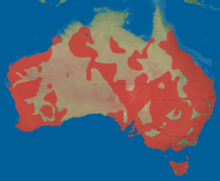| Black swan | |
|---|---|

| |
| in Tasmania | |
| Scientific classification | |
| Domain: | Eukaryota |
| Kingdom: | Animalia |
| Phylum: | Chordata |
| Class: | Aves |
| Order: | Anseriformes |
| Family: | Anatidae |
| Genus: | Cygnus |
| Species: | C. atratus
|
| Binomial name | |
| Cygnus atratus (Latham, 1790)
| |

| |
| Synonyms | |
| |
The black swan (Cygnus atratus) is a large waterbird, a species of swan which breeds mainly in the southeast and southwest regions of Australia. Within Australia, the black swan is nomadic, with erratic migration patterns dependent on climatic conditions. It is a large bird with black plumage and a red bill. It is a monogamous breeder, with both partners sharing incubation and cygnet-rearing duties.
The black swan was introduced to various countries as an ornamental bird in the 1800s, but has managed to escape and form stable populations. Described scientifically by English naturalist John Latham in 1790,[2] the black swan was formerly placed into a monotypic genus, Chenopis. Black swans can be found singly, or in loose companies numbering into the hundreds or even thousands.[3] It is a popular bird in zoological gardens and bird collections, and escapees are sometimes seen outside their natural range.
This bird is a regional symbol of both Western Australia, where it is native, and the English town of Dawlish, where it is an introduced species.[4]
- ^ BirdLife International (2018). "Cygnus atratus". IUCN Red List of Threatened Species. 2018: e.T22679843A131907524. doi:10.2305/IUCN.UK.2018-2.RLTS.T22679843A131907524.en. Retrieved 12 November 2021.
- ^ Latham, John; Latham, John (1790). Index ornithologicus, sive, Systema ornithologiae : complectens avium divisionem in classes, ordines, genera, species, ipsarumque varietates : adjectis synonymis, locis, descriptionibus, &c. Vol. v.2 (1790). Londini: Sumptibus authoris.
- ^ Pizzey, G. (1984). A Field Guide to the Birds of Australia. Sydney: Collins. p. 66. ISBN 0-00-219201-2.
- ^ Smith, Colleen (2018-12-05). "So why are there black swans in Dawlish?". DevonLive. Retrieved 2020-12-26.
